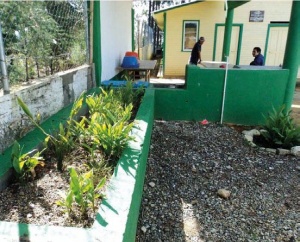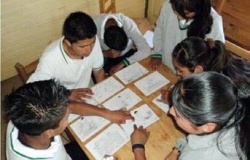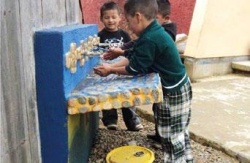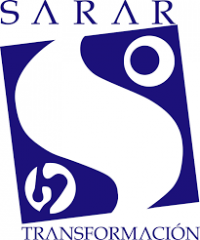Sarar Transformación - School sanitation story from Mexico
Country: Mexico
Contents
[hide]Different settings require different solutions
Basic data:
The SWASH+ project rolled out by Sarar Transformación has reached 17 schools in the three rural Mexican indigenous municipalities. The sanitation solutions were introduced including composting ecological toilets, as well as urine-diverting dry toilets.
The project and the experiences:
Because Sarar Transformación sought to reach more than 2,500 students in seventeen different schools throughout a mountainous region in Oaxaca, it was clear that a single solution would not be right for all of the locations. Instead, the organisation sought to ensure that the school WASH systems were both protective of the environment and appropriate to the settings they are in.
Sanitation solutions were introduced including composting ecological toilets such as Arborloos and Fosas alternas as well as urine-diverting dry toilets. “For boys we have additionally installed waterless urinals. Since we know that urine contains 87% of the excreted nitrogen, from a climate protection point of view, concentrating on the recovery and reuse of urine represents the most efficient means of emission reduction through nutrient recovery. We therefore collect urine and reuse it,” says Fabiola, project coordinator from Sarar Transformación. A portion of the collected urine is applied in the ornamental gardens of the school. The rest is used as a renewable liquid fertilizer in a tree nursery, destined for a WWF (World Wide Fund For Nature) reforestation project. An agreement with the WWF and the Mexican watershed management program ensures a permanent customer for the collected urine.
In addition to the sanitation facilities, fixed handwashing stations were constructed wherever possible. Fabiola, project coordinator from the local NGO, recommends robust and stable hand washing stations. “They are very suitable because they are tougher against percussion which makes them long lasting even in children dominated environments.” However, in some places construction of such stations were not possible due to lack of running water, so “Tippy Taps” were installed in their place. These are easily constructed and suitable for varied environmental conditions. Furthermore, they are portable so that, if the Arborloo needs to be moved, the Tippy Tap can easily be moved along with the toilet. To further conserve water, grey water collection and treatment was implemented wherever possible, meaning that water used for hand washing and dishwashing is collected, treated, and then used to irrigate the existing school garden.
The entire SWASH+ program was coordinated by Sarar Transformación with support from Global Water Challenge and funding from Coca-Cola Atlanta. In order to strengthen and institutionalise the roles and responsibilities of the various local stakeholders, the program formalized the handover process. Local authorities, school committees and the administration thereby agreed to oversee the correct use and management of the installed water and dry sanitation systems and to transmit knowledge and information to the incoming students, parent´s committee members, new teachers and school authorities.
The key lessons of the story:
Fabiola pegged the following aspects as factors of successful school projects:
- Study design of technology while maintaining child friendly appearance for increased user acceptance
- Formalized handover process including the signing of a memorandum of understanding
- Action plan to involve and train newly arriving students and teachers
Contribution to the SuSanA sustainability criteria
Socially Acceptable and Institutionally Appropriate:
Conditions vary between different schools. Hence different solutions are needed.
Project details
Project location: 17 schools in San Miguel Suchixtepec, San Pedro el Alto and San Marcial Ozolotepec, Mexico
Coordinator: Sarar Transformación
Funding: Coca-Cola Atlanta and World Wildlife Fund Incorporated
Project partners: Global Water Challenge, WECF
Sarar Transformación is a reference and support center based in Tepoztlan, Mexico, focused primarily on sustainable decentralised water and sanitation systems (wet and dry) and related issues. The highly creative, dynamic interdisciplinary team of experts is committed to assisting individuals and groups in Mexico and the rest of Latin America in developing sustainable alternatives through participatory approaches.
WWF (World Wildlife Fund) is one of the world’s leading conservation organization, WWF works in 100 countries and is supported by 1.2 million members in the United States and close to 5 million globally. WWF's unique way of working combines global reach with a foundation in science, involves action at every level from local to global, and ensures the delivery of innovative solutions that meet the needs of both people and nature.
GWC (Global Water Challenge) is a non-profit organization to provide safe drinking water, sanitation, and hygiene education worldwide to people who lack these services. Launched by a diverse coalition of corporations, foundations, and aid organizations, the GWC is a unique partnership to build healthy communities and provide sustainable solutions to ensure the availability of potable water for those in need. The goal of the GWC is to bring safe water and sanitation to millions by identifying and multiplying the solutions that work.
WECF(Women in Europe for a Common Future) is a non-governmental organization established in 1994 following the 1992 Earth Summit in Rio de Janeiro, to give women a stronger voice in the field of sustainable development and environment. WECF strives for balancing the environment, health and economy, taking the different needs and perspectives of women and men into account and implements solutions locally and influences policy internationally.
Contact
Fabiola Garduno
Sarar transformación
fabiola![]() sarar-t.org
sarar-t.org




